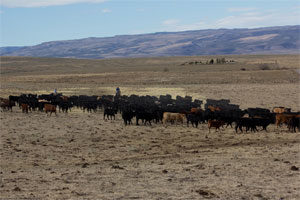While much attention is focused on a warming climate's effects on forest health and wildfires, climate impacts on range used for grazing has received much less scrutiny, said Robert Beschta, a professor emeritus at Oregon State University and lead author of the study.
"Entire rangeland ecosystems in the American West are getting lost in the shuffle,'' Beschta told the Reno Gazette-Journal. "If we don't get recovery under way soon, we may lose that opportunity. The clock is running and it's running pretty fast.''
The study, also authored by researchers from the University of Wyoming, Prescott College and the nonprofit Geos Institute, was published in the journal Environmental Management.
J.J. Goicoechea, president of the Nevada Cattlemen's Association, blasted the study as "silly'' and politically motivated.
But researchers insist the combined impacts of grazing and warming temperatures are having profound impacts on the range across 11 western states, including problems with loss of vegetation, soil erosion, drainage and water quality and disrupted plant and animal communities.
The problem includes not only cattle and sheep grazed by ranchers but impacts on the land from wild horses and, in some places, deer and elk, the study concludes.
Tina Nappe, a Reno conservationist and member of the Sierra Club, said she's not ready to support widespread elimination of grazing on public land but agreed not near enough attention has been paid to impacts of a warming climate on many traditional land uses, grazing among them.
"There's no doubt in my mind our current system does not take into account increased warming,'' Nappe said. "We've known for some time a lot of these uses have to be re-evaluated in view of the fact we are experiencing warmer temperatures.''
Goicoechea told of crushing economic impacts to Nevada's important agricultural industry if the government were to substantially curtail grazing activities. "The impacts would be huge. We can't afford it. We need to keep these strong industries in place.''
Goicoechea said he had heard word the climate report was coming out and characterized it as part of a continuing agenda by "radical environmental groups.''
Beschta said he expects a negative response from ranchers likely to view the study as threatening but that because warming is adding to existing problems associated with grazing on the range, changes are needed now.
"We think it's time to change what we've been doing,'' Beschta said. "It has created a system that's pretty intolerable.'' ![]()
—From AP Newsfinder
PHOTO
Photo by Progressive Cattleman staff.







